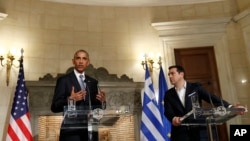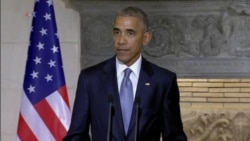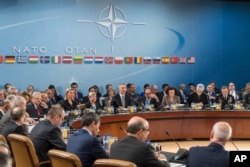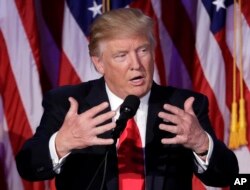President Barack Obama says NATO is "absolutely vital" as he seeks to reassure Europe about the U.S. commitment to the alliance under the presidency of Donald Trump.
In Athens, Greece Tuesday on his last foreign trip as president, Obama said NATO "provides significant continuity even as we see a transition of government in the United States."
Following up on issues raised by President-elect Trump and by previous U.S. administrations including Obama’s, the U.S. leader called on NATO members to spend more on defense.
Obama had praise for Greece. At a news conference with Greek Prime Minister Alexis Tsipras, President Obama congratulated the country for spending more than the minimum goal on defense “even in difficult times.” He said that if Greece can meet its NATO commitment, “all our allies should be able to do so.”
WATCH: Obama on discussions with Greek leaders
Before leaving the White House on Monday, Obama said Trump had expressed to him a “great interest” in maintaining America’s core strategic relations. “And so one of the messages I will be able to deliver is his commitment to NATO and the Transatlantic Alliance,” Obama said. The outgoing U.S. president said he would let European allies know “there is no weakening of resolve when it comes to America's commitment to maintaining a strong and robust NATO relationship.”
European concerns
European leaders, alarmed by Trump’s campaign statements on U.S. commitments, have been anxious for clarification.
Trump’s campaign remarks have also fueled ongoing efforts to establish a European defense force separate from NATO.
At a gathering of EU foreign and defense ministers in Brussels Monday, they spoke of a more urgent need to set up their own collective defense arrangement in the face of what, in the view of some European leaders, could be a new era of American isolationism. Ministers on Monday agreed on a defense plan that would, for the first time, allow EU nations to send rapid response forces overseas.
“Europe needs to be able to act for its own security,” said French Defense Minister Jean-Yves Le Drian.
“Given Trump’s attacks on America’s long-standing security ties in Europe and Asia, U.S. allies have ample reason to worry about the credibility of America’s commitments to their security going forward,” Peter Trubowitz, head of the U.S. Centre at the London School of Economics, wrote after the U.S. election.
Trump on NATO
During his campaign, Trump called NATO “obsolete.” The remark that perhaps alarmed leaders the most, however, was his suggestion that the U.S. would not automatically defend members if they did not make their minimum contribution to the alliance, which translates into nations’ spending at least 2 percent of their GDP on defense.
The remarks were seen as a direct hit on the principle of collective defense, a foundation of the alliance. Article 5 of the North Atlantic Treaty says an attack on one member is considered an attack on all members.
There are indications, however, that some leaders in Europe will be receptive to Obama’s reassurances about the future of transatlantic relations under Trump.
NATO Secretary General Jens Stoltenberg expressed hope, saying he is certain that Trump will be a president “who will live up to all the commitments of the United States in the alliance because a strong NATO is important for Europe but it's also important for the United States.”
Obama’s meetings with Greek leaders Tuesday focused on economic issues and the progress that Greece has made in emerging from its economic crisis and the sacrifices its people continue to make under austerity programs that have been imposed to reduce debt.
He offered no debt relief or new U.S. economic assistance.
The U.S. leader did have praise for the Greeks’ response to the migrant crisis. Obama said people on the Greek islands have shown “extraordinary compassion” even as they faced their own economic hardship.
Foreign policy achievements
As part of his farewell overseas tour, President Obama hopes to showcase his foreign policy achievements and strides made during his term in the war on terrorism that include the 2011 killing of terrorist leader Osama bin Laden, the war on Islamic State militants, and most recently, the launch of U.S.-assisted offensives to retake key cities from IS militants in Mosul, Iraq and Raqqa, Syria.
President Obama will be in Germany on Wednesday before going to Peru later in the week.








